Showing 151–160 of 296 results
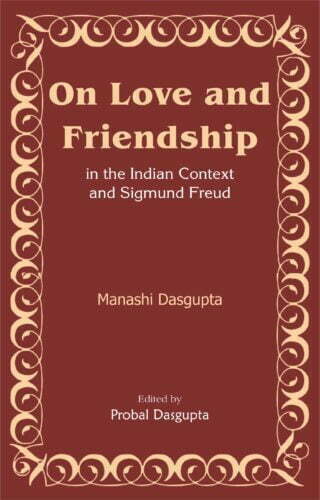
This book revolves around the insight that exchanging feelings and thoughts with friends, in the light-hearted style of open conversations but with the seriousness that only informality can underwrite, is a uniquely valuable mode of exploring questions; it alone nurtures the growth of personal accountability.
This book studies the constitutive role of friendship as a factor contributing to the environment required for serious discussion between accountable adults to take place. The context for this study is a vision that identifies an anti-hierarchical imagination as a prerequisite for democracy and seeks to fashion an institutional format based on friendship, outside patriarchy. This India-focused study, which draws on philosophy, literary/historical analysis, psychological theory and fieldwork, revolves around the insight that exchanging feelings and thoughts with friends, in the light-hearted style of open conversations but with the seriousness that only informality can underwrite, is a uniquely valuable mode of exploring questions; it alone nurtures the growth of personal accountability. The capabilities of this mode as a site for the development of such maturity, the author suggests, go beyond what the institutional structures of academia and other public spaces can possibly support, given the masks that formal structures force on their participants.
The author argues that friendship is a metaproject, a crucible within which projects are incubated; this structural fact makes it difficult to initiate friendships if one is a very young child, not yet able to understand what projects are, or a very old adult, no longer willing to launch any. It is in the context of that argument that the author considers the Freudian view that all acts of friendship are nothing but sublimated manifestations of eros; she suggests that such a claim conflates issues of origin with issues of validity and ignores the metaproject character of friendship bonds.

This souvenir condenses the centenary celebration of the Narayana Gurukula, providing glimpses of timeless wisdom imparted through guru-parampara and bringing together people from all walks of life, bound by a shared commitment to unitive understanding, globally.
One Hundred Suns commemorates the centenary of the Narayana Gurukula, celebrating its growth from humble beginnings into a global movement dedicated to a contemplative life based on the wisdom teachings of Narayana Guru. Recognizing that “man does not live by bread alone”, the Gurukula values enduring happiness through the guidance of the Guru’s Word.
This collection of articles provides readers with glimpses of timeless wisdom imparted through the guru-paramparÀ, a lineage that has nourished generations of disciples. The Gurukula brings together individuals from all walks of life – seniors and juniors, aspirants and adepts, Eastern and Western – bound by a shared commitment to unitive understanding. The personal factor in each case is intact, keeping dogma and credo at bay.
True wisdom transcends distinctions of personal outlook or cultural background, making no divisions between optimism and pessimism, liberal and conservative, orthodox and heterodox, contemplative and active, or Eastern and Western. There is an urgent need for new literature that unifies rather than divides, that balances synthesis with analysis, and that introduces Absolutist norms to provide a steady frame of reference – without which, unchecked fragmentation persists. The articles in this souvenir represent a step toward integration and coherence, and are a testament to undivided perennial wisdom, lighting the way forward as we step into the next century grounded in enduring values, leading to lasting Happiness.

A unique pedagogical method of teaching of Advaita is presented in the Sanskrit trans-creation of Nishcaladasas Vicharasagara and its tippani by Pitambar, by Vasudeva Brahmendra Sarasvati, depending on the need of different types of seekers uttama, madhyama and kanishtha adhikaris simplifying the teaching and learning of Advaita even for laymen.
This book is a critical study of the Sanskrit trans-creation of Vicharasagara by Vasudeva Brahmendra Sarasvati of Nishcaladasa in one of the dialects of Hindi and its tippani by Pitambar, again in the same dialect, imparting a unique teaching technique of Advaita to different types of aspirants. The book thus unfolds the teaching of Advaita depending on the need of different types of seekers uttama, madhyama and kanishtha adhikaris. The volume focuses on two layers of concerns: first, of the appropriate modifications made by the trans-creator using simple Sanskrit and second, in the dialogue between the guru and the different adhikaris.
This critical study introduces us to: (i) the life and works of Nishcaladasa, Pitambar and Vasudeva Brahmendra; (ii) emergence of adhikari-based pedagogy system; and (iii) the employment of pedagogical tools by the guru, depending upon the character and needs of the seeker. The related questions and discussions found in different tarangas of Vicarasagara are pooled in and presented in a cohesive manner to arrive at the core of Nishcaladasas work. It also delves deep into topics such as meditation and its efficacy as a means to gradual liberation, and the nature of liberation.
The book, therefore, introduces the well-defined concepts of Vedanta in a simple pedagogical way as a dialogue between the preceptor and the student, helping even a layman to understand the nuances of Advaita, otherwise a hard subject to digest and grasp.
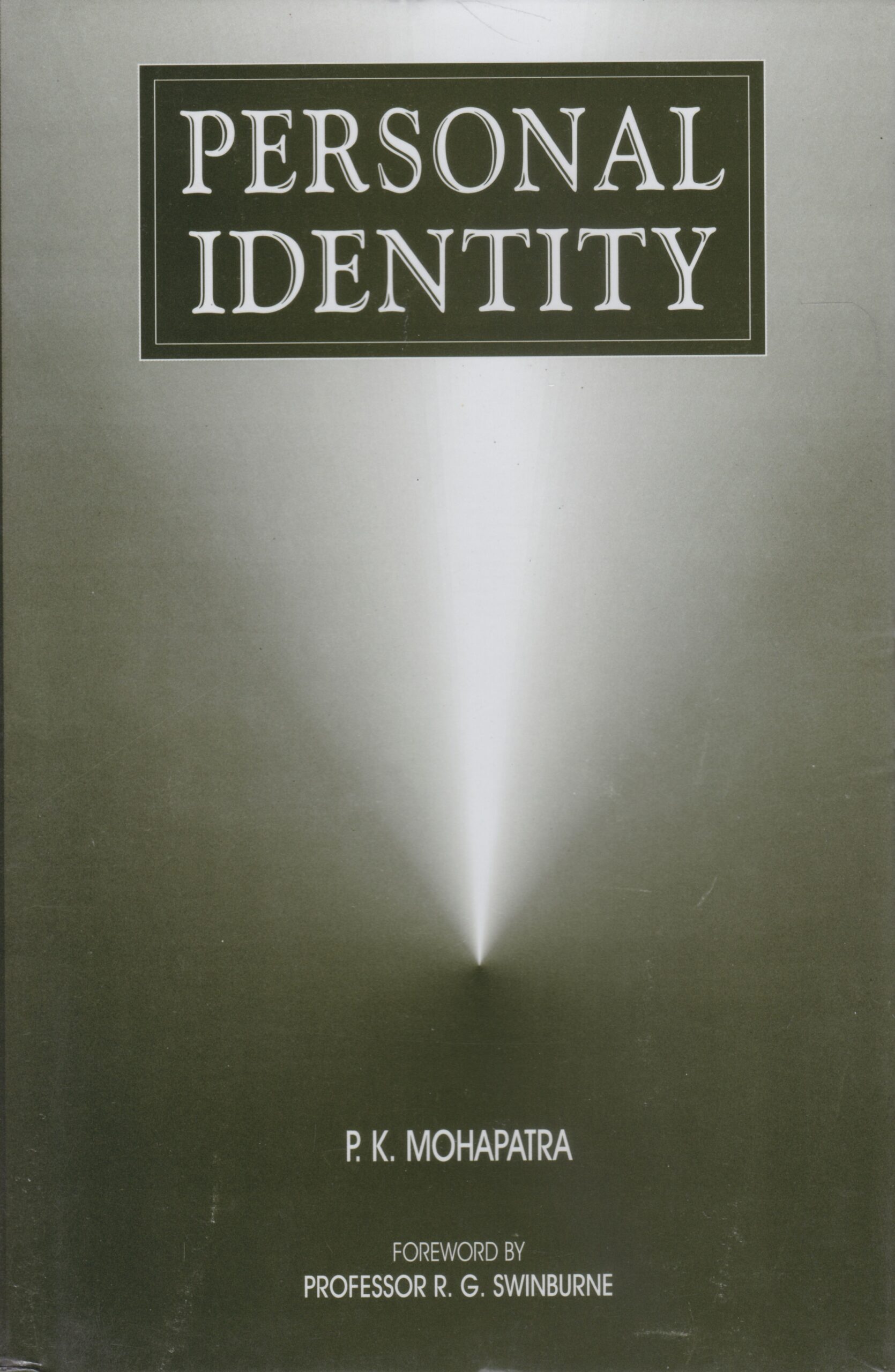
The research studies the problem of personal identity, dealing with the nature/source of the problem, the approach of traditional/modern philosophers and its proper analysis. It finally shows that bodily continuity is the primary criterion of personal identity.
One of the most discussed of current topics in Philosophy of Mind is the problem of personal identity the problem of what, if any thing, makes a later person the same person as an earlier person. The book is a rare attempt to analyse the problem in its various aspects and develop a theory by way of answering the questions involved. It divides itself into three parts dealings with (1) the nature and source of the problem; (2) how it has been approached by various philosophers, traditional and contemporary; and (3) what a proper analysis of it will amount to. The theory that eventually issues out of this analysis is that bodily continuity is the primary criterion of personal identity and the claim of memory as the sole, or even primary, criterion is definitively disallowed. The ideas of disembodied existence and survival, which imply and rest upon the primacy of the memory criterion, are shown to be what they are, i.e., intelligible only in a secondary sense. Of special interest to philosophers is the finding that the problem at issue is a problem of criterion and not of defining personal identity and also an interesting and original trichotomy between definition, criterion and necessary condition.
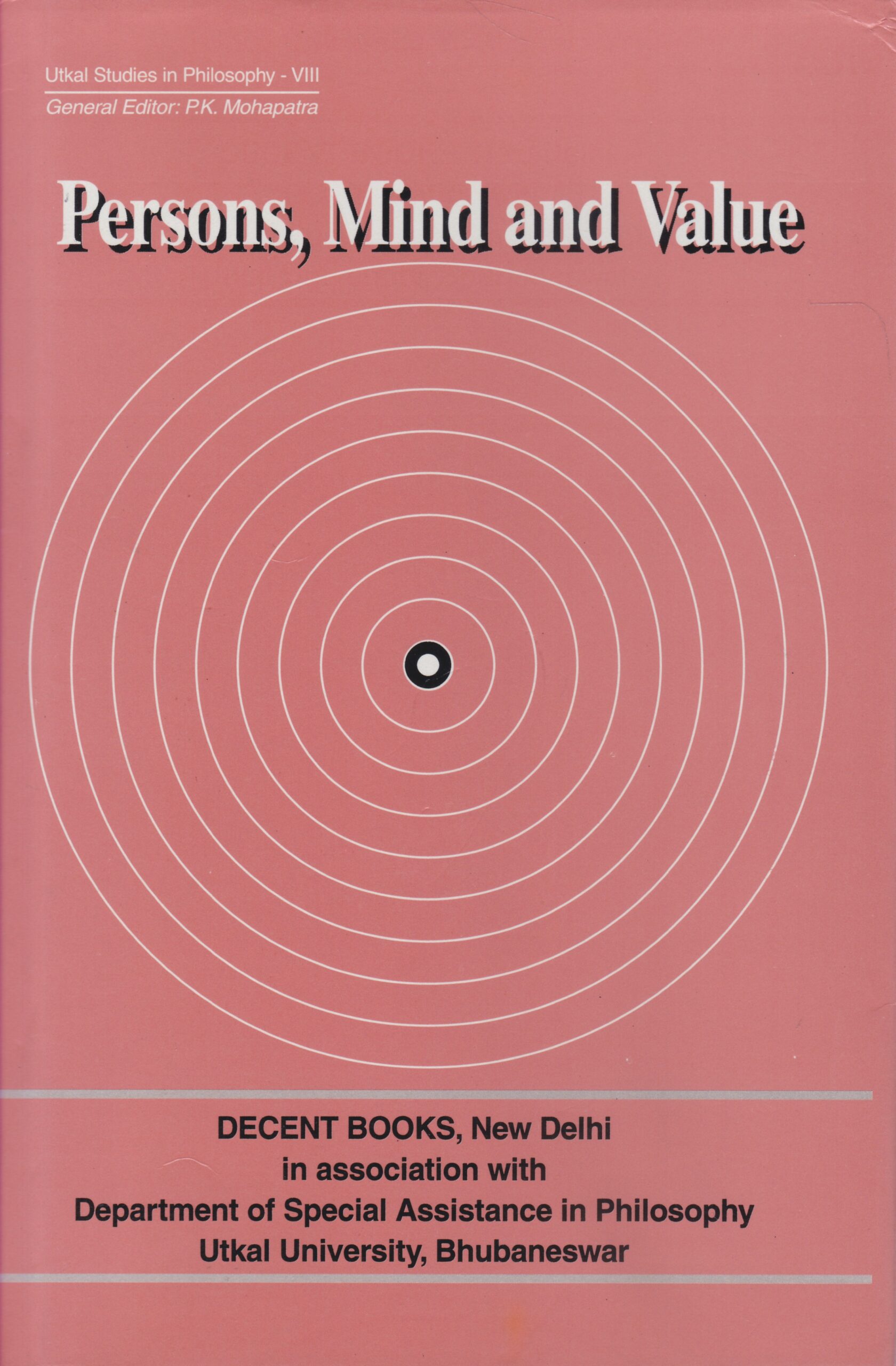
Exploring the link between persons and values, the work delineates the concept of moral personhood. It studies personhood with respect to animal consciousness and artificial intelligence and admits to levels in the application of personhood to human and non-human beings.
Persons, Mind and Value focuses on the link between persons and values: and as values are linked with the mentality of the subjects, relevant features of mind have been brought to focus.Philosophical accounts of personhood have often been used for building normative ethical theories and persons have usually been thought of as moral agents, responsible for their actions done with freedom. Against the backdrop of this, the authors have attempted to delineate the concept of moral personhood which, they argue, is built on spirituality and moral commitment. Although morality is not entirely a matter of pure rationality and moral agency requires self-transcendence and spirituality, the book nonetheless brings out a stricter sense in which moral personhood applies to beings who are rational moral agents. Persons being rational as well as spiritual beings implies that they be moral beings.In course of the defence of such concept of moral personhood, interesting contrast has been made between personhood vis-a-vis (higher) animal consciousness on the one hand and artificial intelligence on the other. And illuminating allusions are made to the possibilities of non-human persons and human non-persons which inevitably lead to conceiving personhood admitting of degrees or levels in its application to human as well as non-human beings. However a firm defence is given to the theory that moral personhood cannot apply to beings who are not even minimally rational.The book is an excellent exercise in analytic elucidation and will immensely benefit students, researchers and anyone interested in moral philosophy and philosophy of mind.
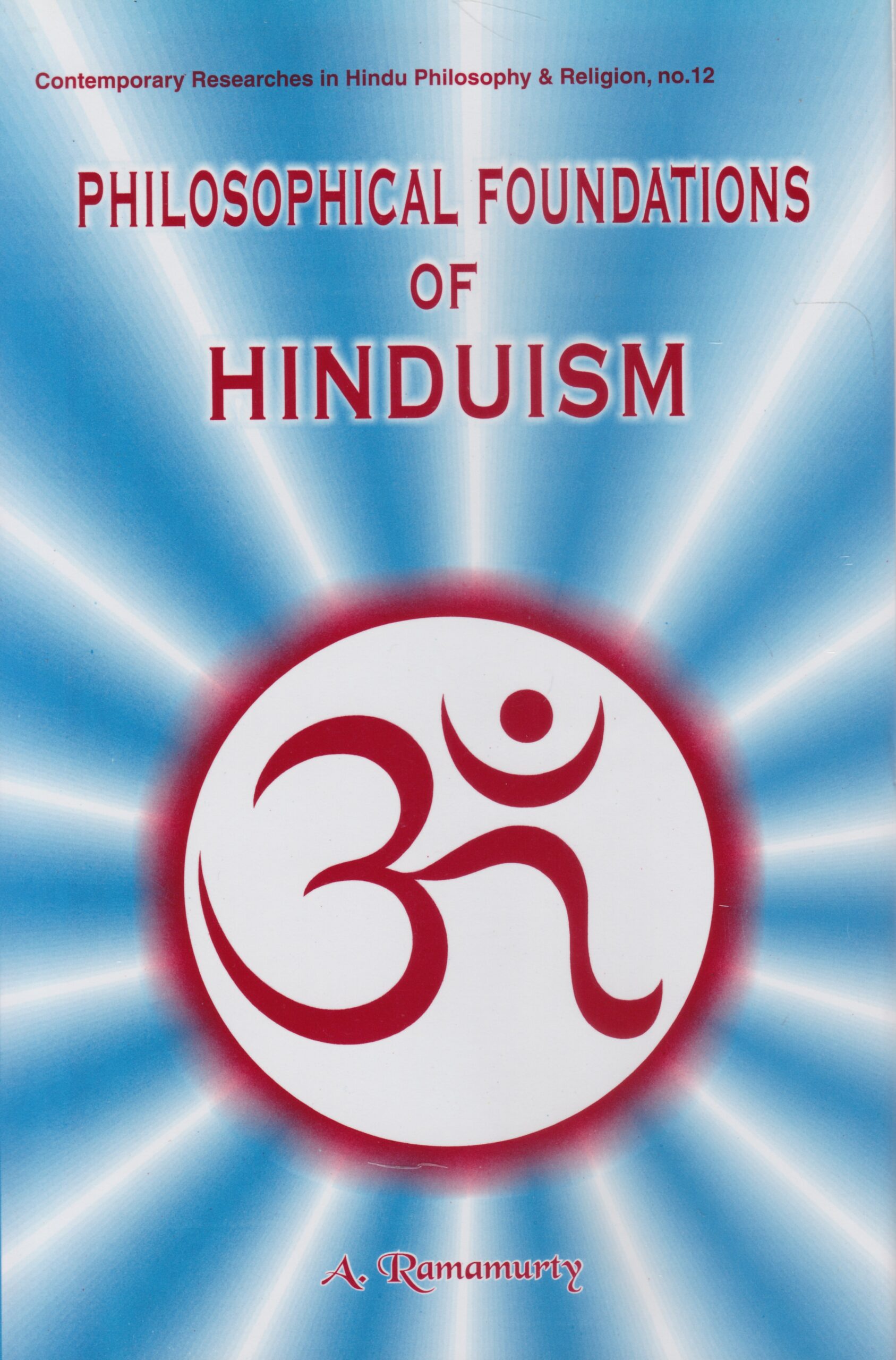
The book presents an understanding of the nature and meaning of Hinduism as revealed in its Sruti and Smrti traditions, examining certain essential aspects of the Hindu philosophical thinking, such as the meaning of dharma and religion, mans understanding of his own existence and reality and the Hindu conception of the divine.
The book presents an understanding of the philosophical roots of Hinduism: the nature and meaning of Hinduism as revealed in its Shruti and Smriti traditions. The discussion begins with an analysis of the Shruti and Smriti streams as integral to Hinduism and shows that the growth and development of Hinduism is a result of constant interaction and mutual influence of the two traditions. It then focuses on the unique Hindu world-view which is the major source of unity of Hinduisms diverse sects and sub-traditions. Prof. Ramamurty exminses in detail certain essential aspects of the Hindu philosophical thinking, such as the meaning of dharma as religion, mans understanding of his own existence and reality, the Hindu conception of the divine and human destiny according to Hinduism. Written in a clear style, the book, reflecting the authors deep scholarship in the subject, includes an index and a bibliography for the readers easy reference and further research on the subject.
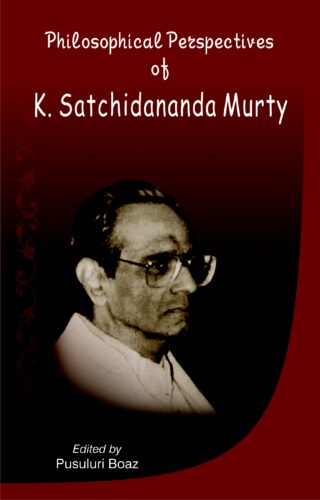
This book critically examines Prof. K. Satchidananda Murty’s understanding of philosophy within the framework of Indian ethos, philosophy and Vedanta. It also clarifies certain misconceptions about Indian culture and history, and further explores the basic issues of ethics and philosophy, man and the transcendent.
This book, on the philosophical contribution of Prof. K. Satchidananda Murty, critically examines his contribution to global under-standing of Indian ethos, philosophy and Vedànta. Dr Boaz explains that Murty has rightly interpreted Indian philosophy with reference to socio-political and physical conditions at different periods of Indian history.
Boaz presents that for Murty, man in his existential condition and world of experience does not satisfy himself with what is around him or what he perceives with his senses. This impulse of man and his intellectual pursuit further lead to know things beyond, which results in metaphysics. Here one explores the profoundity of Murty’s philosophy about man and the transcendent.
Prof. Murty’s spectrum of philosophy is far and wide, and extends to the Far East. With his wide understanding, he also addresses the Indian spirit and tries to clarify certain misconceptions about Indian culture, ethos and history, and adopts a humanistic approach to the study of philosophy as a whole.
This book is of great reference value to the students and teachers of philosophy for it reveals the extraordinarily different perspective of Indian philosophy by a philosopher of our times.

This collection of Prof. N.G. Kulkarni’s writings indicates a landscape of philosophical problems and reasoning towards an understanding of philosophical arguments. The book is divided thematically into four sections: Metaphysics; Language, Truth and Logic; Ethics and Religion; and Indian Philosophy.
This collection of Prof. N.G. Kulkarnis writings indicates a landscape of philosophical problems and reasoning towards an understanding of philosophical arguments. Like most philosophers Prof. Kulkarnis reflections also shaped his beliefs about fundamental notions like mind and body, truth and logic, reason and morality. His thoughts seem to move in both directions: the minute details and consequences of philosophical theses as well as the big picture, as it were, in terms of connecting the diverse themes of ones philosophical world.
The book is divided thematically into four sections: Metaphysics; Language, Truth and Logic; Ethics and Religion; and Indian Philosophy. Metaphysics deals with classic debates ranging from Kants critique of metaphysics, moving through Bradleys coherence theory of truth and the problem of universals and sense-data as well as problems of person and personal identity. Language, Truth and Logic surveys analytic philosophy and its main assumptions, and discusses the importance of logic and language that characterizes a significant part of the twentieth century and indeed shaped and continues to shape the twenty-first century. Issues in Ethics and Religion explore crucial ideas of freedom and violence, in addition to the meaning of the religious and the moral life. Indian Philosophy showcases his scholarly writings on Nyaya and Yoga as well as concepts in Jainism and Buddhism.
This volume should be of great interest to not only students and teachers of philosophy but also across disciplines. Anyone interested in understanding what philosophy is all about will learn one more way of thinking and doing philosophy.
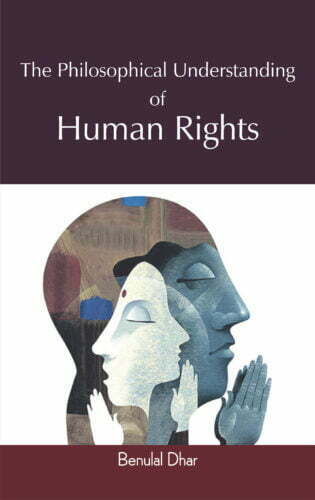
This book investigates the doctrine of natural rights and its critiques, and assesses the world-view which has shaped formulation of the theories of natural rights. It presents a clear exposition of some contemporary philosophical theories of rights developed independently of the natural rights paradigm and discusses the theories wherein the conception of rights is found to be compatible with utilitarianism.
Human rights is a topic that gets vividly and seriously debated at varied platforms, globally. The concept of human rights has a rich philosophical and theoretical tradition, and its philosophical dimension deserves proper attention. Having given an account of the origins and historical development of the idea of human rights, the book investigates the doctrine of natural rights and its critiques, and assesses the world-view that has affected its formulations.
The work also presents a clear exposition of some contemporary philosophical theories of rights developed independently of the natural rights paradigm and discusses the theories wherein the conception of rights is found to be compatible with utilitarianism. And, finally, while briefly arguing for discursive understanding of human rights based on the diversity of morals that is embedded in different cultural traditions of the world and for reconstruction of the conception of human rights in more inclusive and cross-cultural terms, the author analyses the conception of human dignity from the Vedantic perspective as a case study, which is regarded as an important underlying principle of human rights.
The volume is intended to introduce students and practitioners of human rights, and general readers to the philosophy of human rights.
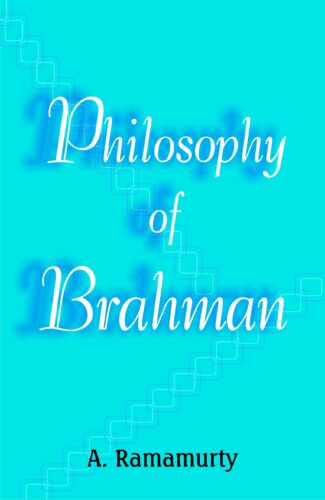
A profound work that addresses the major concern of ancient Indian metaphysical thought. Its discussion on the existence and nature of Brahman is simple and easy to understand. The book should be useful to scholars and students of Indian philosophy as well as to general readers.
This book is in one sense a critique of metaphysics usually viewed as an attempt to explain the existence of the world in terms of a reality which is regarded as the ultimate cause or source of the world, and in another sense to understand metaphysics as a profoundly significant attempt to know or understand the true or real nature of what is there, or what we all experience empirically, or the world. Most of the philosophers belonging to different schools of philosophy tried to understand the world in terms of a reality which is supposed to be the explanation of it. However, in the other approach to metaphysics which we discern in the philosophy of Shankara, and which is in tune with the basic insights of the Upanishads, a comprehensive attempt is made to know or understand the true or real nature of what we know empirically, or the world before any attempt is made to explain its existence. We therefore tried to analyse and understand critically the basic concepts involved in the ontological problem of Brahman, like the nature of the world, its causal explanation, nature and ontological status of matter, consciousness and its relation to spirit or self with a view to understanding the Advaitic insight that Brahman is the true nature of what we experience and know empirically, or the world.
| There are no products |